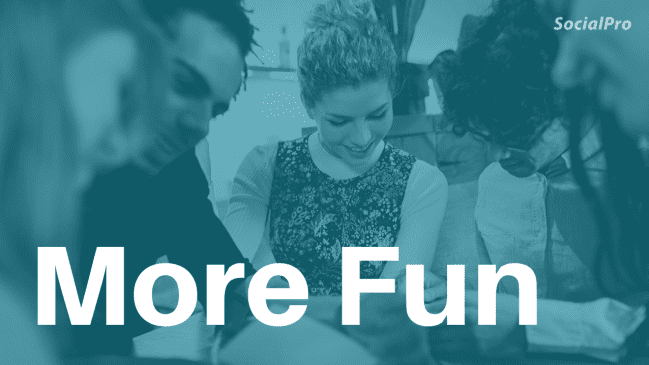Do you feel that you bore people? Perhaps you’re worried that people glaze over when you speak, or maybe you think all your jokes fall flat. In this guide, you’ll learn how to come across as a more fun and exciting person in both one-on-one and group settings.
Sections
How to be more fun
Even if you feel self-conscious or shy in social situations, you can learn how to be less boring and more entertaining. There isn’t one simple trick that will make you more fun. You’ll need to work on developing a relaxed, easy-going attitude while improving some key social skills.
Here’s how to be more fun around other people:
1. Practice being relaxed around people
Fun people put others at ease. You can only do that if you are at ease with yourself. When you feel safe and comfortable around people, you can be yourself. For example, you can make silly jokes and act freely without worrying that other people will judge you.
We all have traits that make us different and unique. When we are relaxed and feel as though we can be ourselves, we can let these traits shine through.
If you are feeling uncomfortable, here are some things to remember:
- People don’t watch your every move. You might feel very self-conscious, but everyone else is focused on themselves, not you.
- If you mess up, ask yourself how a confident person would react if they were in your situation. They probably wouldn’t care, so why should you?
- You’ll be more likable if you talk freely and be yourself. It’s better to say something stupid once in a while than to stay silent because you’re afraid of making a mistake.
2. Show others that you feel relaxed
Fun people usually come across as laidback around others. If you feel stiff in social situations, there are a few things you can do to appear more easy-going:
- If someone says something funny, laugh to show that you appreciate their humor.
- Make confident eye contact. You want to meet the other person’s gaze when you’re talking to them, but avoid staring.
- Keep your body language open and relaxed.
- Be generous with compliments and positive comments. Look for the good in people and situations.
- Don’t censor yourself. Come up with ideas and share them. For example, suggest places to go and things to do. Help other people get to know you by sharing your opinions.
- Learn how to be witty.
3. Avoid judging other people
Deciding not to judge others will help them relax around you. If you’re quick to judge, remind yourself to give everyone a chance.
Treat everyone as a soon-to-be friend. Have an open, relaxed facial expression and ask questions to get to know the other person. Remember that everyone can teach you something. Everyone’s decisions can have merit, even if you would have made different choices.
4. Be a good listener
You can signal that you accept others and want to listen to them through your body language and speaking in a warm tone of voice. That means putting away all distractions and listening to who you are talking to, nodding, smiling, and saying “uh-huh” when appropriate.
Keep eye contact to show that you are listening. Don’t scan the room; if someone sees you looking elsewhere, they could think that you’d prefer to be somewhere else.
5. Open Up
By sharing something about yourself, you’ll help other people feel comfortable enough to open up in return. Open up and tell funny stories about your life and experiences, such as weird jobs you’ve had, a bad blind date, or amusing things from your childhood.
Don’t share deeply personal stories that would make your audience feel uncomfortable. You want to share relatable anecdotes that make people laugh. Remind yourself that for two people to feel like they know each other, they need to know things about each other.
6. Be able to laugh at yourself
People who are OK with being a little foolish are usually more fun to be around than people who take themselves seriously all the time. A small mistake can make you more human and likable. It’s called the pratfall effect. If you trip and fall, you’ll be more likable if you can laugh and joke about it instead of pretending that nothing happened. People enjoy being around those who can laugh at life and the weird situations it puts us in.
A self-deprecating joke can also make you more relatable. But don’t overdo it; if you make lots of jokes at your own expense, people might start to feel awkward.
7. Find your type of humor
If you want to learn how to be funny, start with the kind of humor that makes you laugh. Is it dry sarcasm? Puns and silly turns of phrase? Physical gags with funny faces and body movements? Whatever it is, study it and see if you can reproduce it with your friends and family first. Then incorporate it into your everyday conversations.
8. Be the glue that holds people together
Fun people are often like social glue; they bring groups together and help other people to make new friends. Try to introduce your friends to each other and encourage them to find things in common.
Here are some ways to help you bond with people so you have more fun together:
- Talk about mutual interests you all have.
- Talk about a cool thing one person in the group has done and ask them to tell the rest of the group about it.
- Bring new friends or friend groups together doing something everyone can enjoy, such as bowling, theme parks, ultimate frisbee, soccer, or a games night.
9. Do things that scare you
People who are brave and open to new experiences often have fun stories to tell. Push your boundaries a bit if you tend to stay in your comfort zone. Do new things, even if they scare you a little. If someone invites you to try something new, like a cooking class or going to a speed dating event, and your gut instinct is to decline, do it anyway. Expanding your comfort zone slowly builds up your confidence and your ability to be spontaneous.
10. Be positive
Taking a more positive perspective can make your life more fun in general and make you a more fun person to be around. Being positive is a decision, no different than a decision to eat more greens or spend less time on your phone.
If something bothers you, ask yourself if there’s a positive way of looking at the situation. If something negative is taking up all your attention, remind yourself of other things you can appreciate. These are often the things we take for granted, such as good health, living in a safe home, having a close family or a good friend, enjoying nature, or watching a cool movie.
However, you don’t need to pretend that your problems don’t exist or that your life is perfect. It’s still important to express and process negative emotions. If you lack a constructive outlet for your negative emotions, consider seeking therapy.
We recommend BetterHelp for online therapy, since they offer unlimited messaging and a weekly session, and are cheaper than going to a therapist's office.
Their plans start at $64 per week. If you use this link, you get 20% off your first month at BetterHelp + a $50 coupon valid for any SocialSelf course: Click here to learn more about BetterHelp.
(To receive your $50 SocialSelf coupon, sign up with our link. Then, email BetterHelp’s order confirmation to us to receive your personal code. You can use this code for any of our courses.)
11. Focus on others
If you tend to talk about yourself, ask questions about other people to make them feel comfortable. Or look up fun questions to ask others to find out more about them. As a general rule for balanced interaction, everyone should spend a similar amount of time talking.
12. Take breaks in social situations
You can only push yourself so far. Recharge your batteries when you need to have the energy, both emotional and physical, to keep going. For example, if you’re at a party, take a 5-minute break in the bathroom. Or if you’ve had a full week, allow yourself to have the Sunday all by yourself. Self-care is just as important as caring for other people and should take priority over socializing.
How to be more fun when you’re in a group
Socializing as part of a group can be fun, but it can also trigger anxiety, even if you already know everyone in the room. You might find it hard to speak up because you’re afraid of being judged, or worry that you’ll have nothing to add to the conversation. But you can learn how to relax and come across as more charismatic in a group setting, even if you’re surrounded by confident, extroverted people.
Here’s how to be more fun and entertaining when you’re in a group:
1. Allow yourself to be original
We’re all unique. Embrace what makes you stand out from everyone else. For example, if you like anthropology and death metal bands, open up to others and talk about those topics if you think they might share your interests.
Share your opinions as long as you respect everyone else’s opinions. As you share, ask others for their thoughts. Be ready to hear alternative points of view, even if they are the direct opposite of what you believe, and try to see the merit in other people’s perspectives. Being open-minded is an admirable trait. It means you can get along with anyone.
2. Use your facial expressions to show your feelings
Facial expressions make a big impression on others when we use them to maximum effect. For example, eyebrows can show anger, surprise, fear, joy, or confusion; they can work as an exclamation mark in our conversations.
People who animate their facial expressions tell exciting stories. Even if the story content is not perfect, the delivery can make it better. So practice telling a story in the mirror using your eyebrows and facial expressions and then without. You’ll soon see the difference.
3. Find and focus on mutual interests
As you talk with people, you will be able to pick up on their interests as you get to know each other. Use what you learn to steer the conversation in that direction and find interesting things to talk about.
For example, if you learn that someone shares your love of history, you could mention a history documentary that you found interesting. By highlighting something that relates to your shared interest, you could spark a conversation that both you and the other person will enjoy.
4. Bring energy to all your conversations
If you often find yourself in situations where you’re timider than everyone else, there are strategies you can use to bring more energy to social situations.
First, a word of warning: don’t fake enthusiasm or passion if you don’t feel it. Faking consumes a lot of energy, and it looks and feels inauthentic. Instead, try to boost your energy in a way that feels comfortable for you.
Here are some things to try to become more high-energy:
- Think back to a time when you were enthusiastic about telling a story or talking about something that excites you. See if you can tap into that mood again.
- Listen to high-energy music before a social event.
- Drink some coffee or other caffeinated drink.
- Use your voice to show that you are passionate about a subject; let yourself laugh, speak clearly, and try not to mumble.
- Use hand gestures to emphasize your points. For example, you can move your hands closer together or further apart to indicate size or distance.
Here’s how to be more fun to talk to:
- Don’t just give “yes or no” answers. Elaborate and share something from your life, e.g., “My morning was good, but I was so tired. At least I managed to make oats and eggs.”
- Return questions you receive. e.g., “So that was my morning. How was yours?”
- Ask follow-up questions. e.g., “So what did he say when he realized what had happened?”
- Be positive. Talk about problems and negative things only if it’s absolutely necessary.
- Give compliments. If you like something someone’s done, compliment them on it.
- Remember what people tell you and ask follow-up questions that relate to your previous conversations. e.g., “Last week, you told me your daughter had a cold. Is she better now?”
5. Know a little about a lot of things
Try to keep up with current events, memes, movies, and shows. When you know a little about a lot of things, it’s easier to contribute to general conversations a group might have on those topics.
6. Be present and personal during the conversation
Make a conversation more personal by focusing all your attention on the speaker when they talk. Don’t just wait for your turn to talk. Instead, listen to understand what your conversation partner is really saying.
Add relevant ideas and thoughts to the discussion if you think they’ll make the conversation better. Make your comments thoughtful and topic-related. Add your feelings and ideas to the topic to make the interaction more personal.
For example, if you and your friend are talking about living in the city and how expensive it is, try asking where your friend would live if money wasn’t an issue. Or you could ask your friend where they would live in the world if they could pick up and move there today. When you ask more personal questions, you move from general facts to deeper, more meaningful conversations.
7. Tell a great story
Fun people often have entertaining stories to tell. But storytelling doesn’t come naturally to all of us—it’s an art that takes practice. If you want to master storytelling, have a look at this article How to be Good at Telling Stories – 6 Storytelling Principles.
Here are a few key things to remember:
- Tell a story that’s relevant to whatever you and the group have been talking about.
- For a story to be entertaining, it must be relatable. Stories about our struggles go down better than stories about our successes.
- Explain the context of the story first. Tell your audience why it’s exciting.
- Avoid boring your audience by including too many details. Focus on emotions rather than irrelevant facts. For example, describe why and how the events in your story made you feel scared, surprised, angry, or happy.
- Pick the right story for your audience. For example, save stories about work for your work friends and family stories for your Grandma.
- As you tell the story, build suspense by adding all the relevant details and emotional context, then drop the punchline at the end.
8. Command attention with your body language
You want your body language to signal that you are confident and belong in the room. You want your posture, tone of voice, and gait to say, “I enjoy being here.” If you signal that you’re having fun, others will think it’s more fun to be around you.
The great speakers in the world have mastered the art of body language and consistently project the message they want to convey. Have a look at these speeches on YouTube of Barack Obama, Oprah Winfrey, and Tony Robbins to see how they own the room with their body language. (Tony is particularly good at this.)
These people are animated and energetic. They are 100% focused on the people they are talking to, and their attitude makes those around them feel good.
You can practice your body language in your mirror. You won’t see improvements overnight, but with practice, you’ll make progress. The next step is to practice with family and close friends. Or, try practicing with strangers if you prefer. Sometimes it’s easier to try new ways of acting around people you haven’t met before.
Practice being the center of attention and think about what you say, how you say it, and making it impactful. If you’re excited about what you’re talking about, your audience will be too.
9. Accept that not everyone will enjoy your company
When you meet and talk with lots of different people, you’ll notice that not everyone is open and receptive to your charm. That’s not a problem. Not everyone is meant to be on your team.
Just because someone doesn’t enjoy your company doesn’t mean that no one will. There are tons of people in the world. It’s normal to click with some people and not with others. There isn’t a one-size-fits-all when it comes to friends. However, we can have an enjoyable chat with most people we come across. In some cases, that chat turns into a real friendship.
The benefits of play
Having fun and joking around with your friends isn’t just an entertaining way to pass some time. Research has shown that having fun with other people can benefit your mental health, social life, and career. Here are some of the reasons why playing and having fun are good for you:
1. Play can make you happier
According to a 2019 study published in Current Psychology, people who report that their same-sex friendships are playful tend to be happier than those with less playful friendships.[1]
The results of the study also found that playfulness in a friendship is linked to high friendship quality and lower levels of conflict.[1] The authors propose that when you can play and have fun with your friends, you can be your true self, which may make you happier.
2. Playful people cope better with stress
A 2011 survey study with young adults found that, compared to less playful individuals, playful people tend to experience lower levels of emotional stress when faced with a problem.[2]
This may be because playful people are good at taking a broad, balanced view of a challenging situation. This approach may help them to keep their problems in perspective and to come up with effective, creative solutions.
3. Play can help you perform better at work
In 2007, Yu and colleagues surveyed 1493 employees in a study on the link between playfulness and work outcomes. The participants were asked to complete questionnaires that measured playfulness, attitudes towards work, and how well they carried out their jobs.
The researchers found that playfulness is positively correlated with job satisfaction and performance,[3] possibly because employees who have fun at work are more likely to enjoy themselves and make more of an effort to do their jobs well.
4. Playfulness is attractive
An ability to make people laugh may be an advantage if you’re looking for a romantic relationship. The results of a BBC survey of over 200,000 people revealed that heterosexual men and women rank humor as an attractive trait in a partner.[4] This could be because, for many people, humor is linked to positive traits, such as likability and agreeableness.[4]















word of advice for gabriel. stick to being you.
Rigorous. I will be reaching out!
This was very helpful in preparing me for my interview tomorrow,
thank you
WOW i mean it i am going to try it in my school
im also going to try it
I loved your post so much I became a fan of you, promise that you will continue to share such good and knowledgeable posts even further, we will be waiting for your post thank you
Thanks David.
david will never see this, stop dickriding.
Thank you David.
You send emails that make sense. Your content is practical and easy to follow. Thanks for thinking about others.
God Bless you.
Yep
nope
I really like this article. Keep up the great content!
This article really resonated with me and it reminds me that one way I can connect with my students is to tell stories and listen to their stories. I don’t get it right every time, but I notice that it may only take a few minutes to share a story and experience a lot of fun.